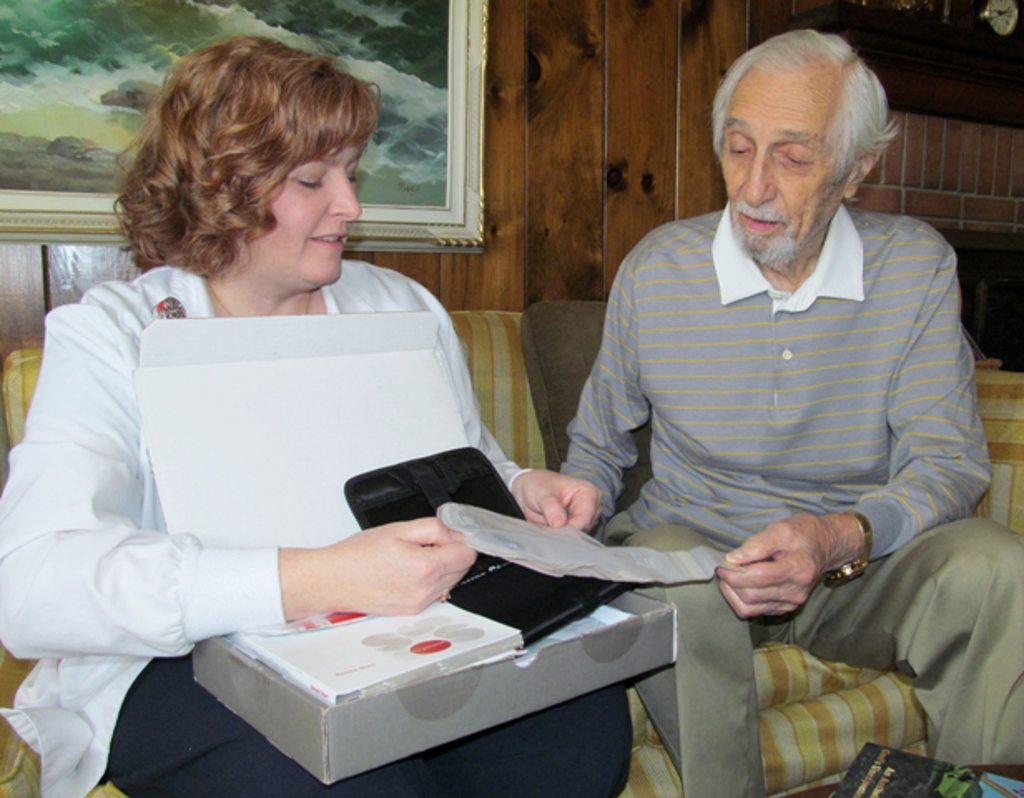
Support for Ostomates
A pill to improve your health can be taken and no one knows about it. Some medical devices, such as a pacemaker, can be inserted and never seen.
But an ostomy-bag – though rarely visible - is something that people can be self-conscious of.
A support group hosted by Penn Highlands Clearfield Home Health provides emotional support and useful information for individuals living with an ostomy. It is a unique support group not only in the Penn Highlands Healthcare system but in the country.
“People who are living with this type of medical device need to know that they are not alone – there is support available, and that’s why we started this support group back in 2007,” Heather Kisamore, group facilitator, said. “Many of our members are surprised to learn that one million Americans are living with an ostomy, and that many famous people had one too, such as Ed Sullivan, Bob Hope and Fred Astaire.”
Kisamore, a registered nurse who is certified in wound, ostomy and continence care, explained that an ostomy is a surgically-created intestinal or urinary tract diversion that creates an opening (stoma) from an area inside the body to the outside . If an organ is affected, such as the small intestine, colon, rectum or bladder, there must be a new way for wastes to leave the body.
An ostomy can be permanent, depending on the location of the affected area and the disease process, such as some types of cancer. It can be temporary, when the bowel or bladder needs time to heal after surgery. Medical conditions that might require this device include complications from diverticulitis, colon or bladder cancer and inflammatory bowel disease.
There are many different types of ostomies, such as an ileostomy from the small intestine, a colostomy from the colon and an urostomy from the kidneys.
Although ostomy surgery can bring great relief, many people have concerns with practical and social issues related to having this type of surgery.
The Ostomy Support Group meetings are informal, round-table discussions on topics of interest, new product demonstrations and a question-and-answer session with the enterostomal therapy nurse or wound, ostomy and continence nurse.
Guest speakers are featured several times a year. Speakers include certified wound, ostomy and continence nurses, physicians, pharmacists, physical therapists, durable medical equipment representatives, dietitians, ostomy appliance companies and insurance representatives.
“People facing life with an ostomy, whether temporary or permanent, have many questions and concerns. They often wonder if they will be able to participate in activities they enjoyed before, like swimming or exercising. We are here to provide them with the resources and information they need to return to the quality of life they enjoyed before having an ostomy,” Kisamore explained.
Kisamore said the group members are supportive of each other, and those who have been with the group for a while are very helpful to new members.
“The new members usually ask the others about what it was like going out in public for the first time with an ostomy. They wonder if people will notice that they have an ostomy. They soon realize that the (ostomy) pouch isn’t visible through clothing, so no one would ever know they had one. They can even wear a bathing suit,” she said.
There is no fee to attend meetings. Meetings are held the first Tuesday of each month from noon – 1 p.m. at the Penn Highlands Clearfield Home Health and Hospice office located at 440 Front Place, Clearfield. The next meeting is Tuesday, May 3. Family members are encouraged to attend.
“We are proud of how the support group has grown over the years and believe that we’ve helped to increase understanding of living with an ostomy. We are unique in that we are the only ostomy support group in the region, and are one of only 334 groups nationwide,” Kisamore said.
For more information about the support group in Clearfield, please call Kisamore at (814) 768-2025.
